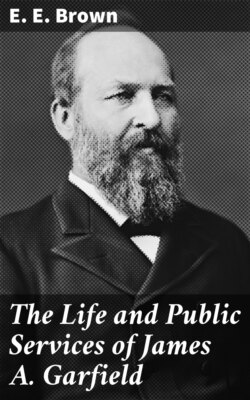Читать книгу The Life and Public Services of James A. Garfield - E. E. Brown - Страница 5
На сайте Литреса книга снята с продажи.
CHAPTER II.
ОглавлениеTable of Contents
Boyhood of James.—Attempts at Carpentry.—First Earnings.—His Thirst for Knowledge.—The Garfield Coat-of-Arms.—Ancestry, etc.
True to his promise, Thomas returned in a few months with seventy-five dollars in gold, which seemed a great sum to the little family.
"Now you shall have the new house, mother," he exclaimed; and it was not many days after, that the carpenter was hired and the work begun.
James watched the building with keen, observant eyes. Before the house was completed he had learned a good part of the trade and practised it besides.
"I think I'll have to employ you when I want an extra hand," laughed the good-natured mechanic, as he noticed how cleverly James used the mallet, chisel and plane.
"I wish you would; I like the trade," exclaimed the boy, with sudden earnestness.
After the family had moved into the new house, which consisted of three rooms below and two above, Thomas went back to his work in Michigan, and James returned to his labor on the farm.
But the boy's restless spirit longed for a wider field. If he could only earn a little money, perhaps he would be able to buy a few books.
Passing the carpenter's shop one day, he saw a pile of boards at the door waiting to be planed. He stepped inside and asked for the job, which was readily given him.
"I will give you a cent a board," said the carpenter, "for I know you will do them well."
"How soon do you want them done?" asked James.
"Oh! it doesn't matter," answered the carpenter; "take your own time for them."
"All right!" said the boy, "I'll begin early to-morrow morning, just as soon as I get through with the chores on the farm."
Before night he had planed a hundred boards, and each board was twelve feet long!
He asked the carpenter to come and count them, lest he had made a mistake.
"That is too hard a day's work for a little fellow like you," exclaimed the astonished man; "but here are a hundred pennies, as I promised you."
This was the first money that James had ever earned, and it was with a proud, happy heart he emptied his load of coppers that night into his mother's lap.
It was not a difficult matter to find jobs after that. A boy who could plane a hundred boards in a day was just the sort of help the enterprising carpenter wanted. Not long after, he engaged James to help him put up a barn, paying him about twenty dollars for the job.
By this time James had learned about all he could in the district schools. He had performed problems in arithmetic that puzzled his teachers, and could repeat by heart the greater part of his reading books. A copy of "Josephus" came into his hands, and he read it over and over until long passages were indelibly impressed upon his memory.
"Robinson Crusoe," "Alonzo and Melissa," he devoured that winter with all a boy's enthusiasm, and the little home in Orange seemed smaller to him than ever. He longed to go out into the world and find a wider sphere of labor. The blood of his old Welsh ancestors was burning in his veins. He had often looked at the old Garfield coat of arms, which his father had kept with loyal pride, and wondered what it meant. Now he seemed to understand, as if by a sudden intuition, the crimson bars on the golden shield, with that strong arm, just above, wielding a sword, whose motto read, "In cruce vinco."
"Tell me about my great-great-grandfathers," he said one day to his mother, as they were sitting together by the open fire.
"Your father's family came from Wales," she answered, "and the first James Garfield was one of the brave knights of Gaerfili Castle. But that is going a long way back. I know your father used to say he was more proud of having an ancestor who had fought in the Revolutionary War, and that was Solomon Garfield, your own great-grandfather."
"How splendid it is to be a soldier!" exclaimed James.
"Yes," said his mother, "but there are many grand victories won in the world besides those upon the battle-field."
And just here it may be said that it was not only from his father's side that James Garfield inherited so many sterling traits of character. His mother is a descendant of Maturin Ballou, a French Huguenot, who joined the colony of Roger Williams, and settled in Cumberland, Rhode Island. From this pioneer preacher, a great many eminent men have sprung, among them the celebrated Hosea Ballou, a cousin of Eliza Ballou Garfield.
